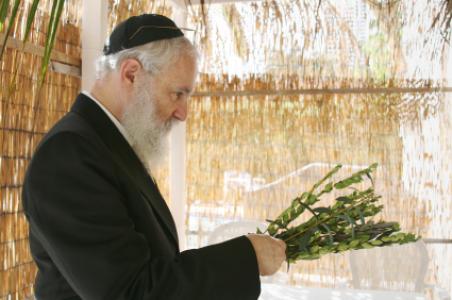
First day of Sukkot
Sukkot is a Jewish holiday lasting 7 days. It begins on the 15th of Tishrei, which falls into September or October.
Jewish people celebrate Shemini Atzeret, also spelled Shmini Atzeret, on the day after Hoshana Rabbah, the last day of the Sukkot festival. In the UK, it is followed by Simchat Torah.

Shemini Atzeret involves a prayer for rain.
©iStockphoto.com/Jurgute
Shemini Atzeret immediately follows the Sukkot period. It is marked on the 22nd day of Tishrei, which is the seventh month of the Jewish calendar. It falls into September or October in the Gregorian calendar.
In the United Kingdom and all other countries outside of Israel, it is followed by Simchat Torah. In Israel, the two holidays fall on the same day.
No, Shemini Atzeret is not a bank holiday in the United Kingdom. However, Jewish businesses, organizations, and schools are usually closed on this and the following day.
Shemini Atzeret and Simchat Torah are among the most joyful occasions of the Jewish calendar year. Both days are Yom Tov, special holidays when Jewish people are prohibited from working and a range of additional restrictions apply.
In some Jewish communities in the UK, the Hakafot is performed, usually both on the eve of Shemini Atzeret and on the day itself. This event, which is otherwise primarily associated with Simchat Torah, involves people dancing and singing while carrying the Torah scrolls. It usually involves the whole family, including children.
Since Shemini Atzeret is celebrated at the beginning of the rainy season around the Mediterranean Sea, the morning service on this day traditionally involves a prayer for rain and a good harvest, known as the Tefilat Geshem.
Literally meaning “eighth day” in Hebrew, Shemini Atzeret is celebrated on the eighth day after the beginning of the Sukkot period. As such, it is explicitly linked to and considered as a spiritual culmination of Sukkot.
At the same time, Jewish people are careful to treat Shemini Atzeret as a holiday in its own right by following its unique customs and making sure to cleanly separate the traditions associated with Sukkot from those attributed to Shemini Atzeret. For example, while some Jewish people still use the sukkah, it is frowned upon to prepare for Shemini Atzeret on the last day of Sukkot or to perform the ritual of the Four Kinds on Shemini Atzeret.
Shemini Atzeret is an occasion to rejoice in God's love and his acceptance of the Israelites' repentance after having committed the sin of worshipping a golden calf, as told in the Book of Exodus.
The United Kingdom is estimated to have the 5th largest Jewish population in the world, with just under 300,000 people practicing the Jewish faith in the country. By far the largest British Jewish community is found in London, followed by those in Manchester and Leeds.
Jewish settlement in England can be traced as far back as the time of the Norman Conquest in 1066. The Jewish community outnumbered the Spanish and Portuguese communities in England by the 18th century.
Many Jewish families in Eastern Europe moved to England to escape persecution and hardship between 1881 and 1914. About 150,000 Jewish people settled in England, with large numbers staying at London's East End during that time. England continued to receive Jewish immigrants escaping persecution around the time of World War II (1939-1945).
In the Jewish diaspora—Jewish communities outside of Israel—an extra day is usually added to religious observances, with the exception of Yom Kippur, which lasts only one day worldwide, and Rosh Hashana, which is celebrated over two days in both Israel and the diaspora.
This custom has its roots in ancient times when the beginning of the months in the Jewish calendar still relied on the sighting of the crescent Moon following a New Moon.
The beginning of a new month was determined by the Sanhedrin, the supreme court of ancient Israel in Jerusalem. Once the date was published, messengers were dispatched to spread the news among Jews living abroad. Since this process took some time, it was decreed that Jews outside of ancient Israel were to observe every holiday for 2 days to make sure that the rules and customs applicable to each holiday were observed on the proper date. This rule is still observed today.
Note: Jewish holidays begin at sundown the day before the date specified for the holiday.
| Year | Weekday | Date | Name | Holiday Type |
|---|---|---|---|---|
| 2019 | Mon | Oct 21 | Shemini Atzeret | Jewish Holiday |
| 2020 | Sat | Oct 10 | Shemini Atzeret | Jewish Holiday |
| 2021 | Tue | Sep 28 | Shemini Atzeret | Jewish Holiday |
| 2022 | Mon | Oct 17 | Shemini Atzeret | Jewish Holiday |
| 2023 | Sat | Oct 7 | Shemini Atzeret | Jewish Holiday |
| 2024 | Thu | Oct 24 | Shemini Atzeret | Jewish Holiday |
| 2025 | Tue | Oct 14 | Shemini Atzeret | Jewish Holiday |
| 2026 | Sat | Oct 3 | Shemini Atzeret | Jewish Holiday |
| 2027 | Sat | Oct 23 | Shemini Atzeret | Jewish Holiday |
| 2028 | Thu | Oct 12 | Shemini Atzeret | Jewish Holiday |
| 2029 | Mon | Oct 1 | Shemini Atzeret | Jewish Holiday |
While we diligently research and update our holiday dates, some of the information in the table above may be preliminary. If you find an error, please let us know.

Sukkot is a Jewish holiday lasting 7 days. It begins on the 15th of Tishrei, which falls into September or October.

Jewish people in the UK celebrate Hoshana Rabbah, also spelled Hoshana Raba, on the last day of the Sukkot festival.

Simchat Torah (Simchas Torah or Simhat Torah) is a Jewish holiday that celebrates the completion of the annual reading of the Torah.

The summer bank holiday is on the first Monday of August in Scotland and the last Monday of August in England, Wales and Northern Ireland.